vue组件传值有哪五种方法
- 青灯夜游原创
- 2021-10-27 16:16:2556705浏览
vue组件传值的五种方法:1、父组件向子组件进行传值;2、子组件向父组件进行传值;3、相邻兄弟组件间进行传参;4、远兄弟组件间进行传参;5、EventBus传参。

本教程操作环境:windows7系统、vue2.9.6版,DELL G3电脑。
Vue的通信方式,也可以说是传参方式:
父组件向子组件进行传值:
子组件向父组件进行传值:
相邻兄弟组件间进行传参(亲兄弟)
远兄弟传参(表兄弟)
EventBus传参
一、父子传参
原理:父控制子,通过子组件的props属性,抛出子组件自定义标签属性,来接收父组件的操作状态
例子:父级里的一个按钮,控制子组件里的一个p的显示隐藏
<!DOCTYPE html>
<html>
<head>
<meta charset="UTF-8">
<title>Document</title>
</head>
<style>
.div{
width:200px;
height:200px;
background:pink;
}
</style>
<body>
<!-- 这里的app范围就是 子组件son 的父级 -->
<div id="app">
<button @click='change'>父按钮</button>
<hr>
<!-- ********** 自定义标签属性test,接收父级的state ************-->
<son :test='state'></son>
</div>
<template id="tp1">
<div>
<!-- ************ 调用自定义属性test **************-->
<div v-show='test'>我是子组件的div</div>
</div>
</template>
<script src="../vue/vue.js"></script>
<script>
// 局部定义 子组件son
new Vue({
el:"#app",
data:{
state:true
},
methods:{
change(){
this.state = !this.state;
}
},
components:{
son:{
template:"#tp1",
//*********** 抛出自定义标签属性 ***************
props:['test']
}
}
})
</script>
</body>
</html>效果:
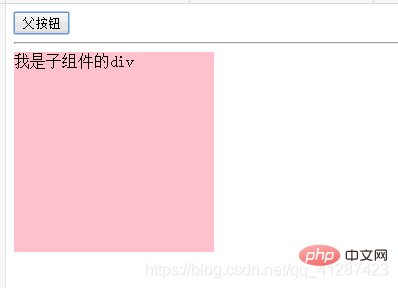
二、子父传参
原理:子控制父,子组件绑定自定义事件,来处理父组件的方法函数,通过.$emit(‘自定义事件’,[参数])来触发属于自己的自定义事件
例子:子组件里一个按钮,控制父组件里的一个p的显示隐藏
<!DOCTYPE html>
<html>
<head>
<meta charset="UTF-8">
<title>Document</title>
</head>
<style>
.div{
width:200px;
height:200px;
background:pink;
}
</style>
<body>
<div id="app">
<c1></c1>
</div>
<!-- 父组件c1 子组件c2 子组件自定义事件test-->
<template id="c1">
<div>
<div v-show='state'>father显示/隐藏</div>
<hr>
<!--************ 子组件c2自定义事件,执行父组件c1的方法函数change_f ***************** -->
<c2 @test='change_f'></c2>
</div>
</template>
<template id="c2">
<div>
<button @click='change_son'>子按钮</button>
</div>
</template>
<!-- 引入Vue.js框架文档,可在官方文档下载-->
<script src='../vue/vue.js'></script>
<script>
//全局定义
// 实例化 父组件c1
Vue.component("c1",{
template:"#c1",
data(){
return {
state:true
}
},
methods:{
change_f(){
this.state = !this.state;
}
}
})
// 实例化 子组件c2
Vue.component("c2",{
template:"#c2",
methods:{
change_son(){
// ************ 在子组件方法里,触发子组件自定义事件 ******************
this.$emit("test")
}
}
})
//实例化一个Vue对象
new Vue({
el:"#app"
})
</script>
</body>
</html>效果:
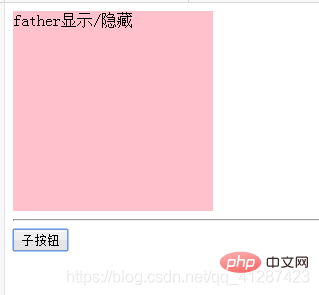
三、相邻兄弟传参(亲兄弟)
原理:通过一个公有的父元素作为桥接(实例 组件),结合父子props 传参 、子父自定义事件
例子:c1、c2是兄弟关系 c1可用控制c2里元素的显示隐藏
<!DOCTYPE html>
<html>
<head>
<meta charset="UTF-8">
<title>Document</title>
</head>
<style>
.div{
width:200px;
height:200px;
background:pink;
}
</style>
<body>
<div id="app">
父级状态
<p>{{state}}</p>
<hr>
<c1 @test_c1='change_f'></c1>
<hr>
<c2 :test_c2='state'></c2>
</div>
<template id="c1">
<div>这里是c1组件
<button @click='change_c1'>c1按钮</button>
</div>
</template>
<template id="c2">
<div>这里是c2组件,状态:{{test_c2}}
<div v-show='test_c2'>我是c2中的div</div>
</div>
</template>
<script src='../vue/vue.js'></script>
<script>
Vue.component("c2",{
template:"#c2",
props:['test_c2']
})
Vue.component("c1",{
template:"#c1",
methods:{
change_c1(){
this.$emit("test_c1")
}
}
})
new Vue({
el:"#app",
data:{
state:true
},
methods:{
change_f(){
this.state = !this.state;
}
}
})
</script>
</body>
</html>效果:
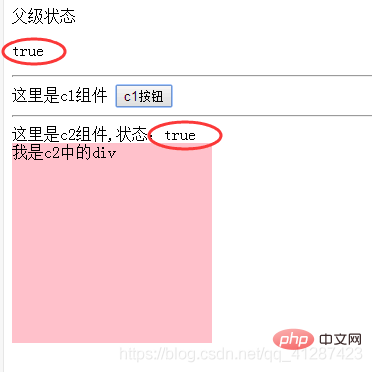
四、远兄弟传参(表兄弟)
原理:通过创建一个中间实例,注册一个事件,在被控组件中,通过事件携带要执行的函数,在主控组件中,通过事件,改变相应的操作

<!DOCTYPE html>
<html>
<head>
<meta charset="UTF-8">
<title>Document</title>
</head>
<body>
<div id="app">
<father></father>
</div>
<template id="father">
<div>
这是父组件
<hr>
<son1></son1>
<hr>
<son2></son2>
</div>
</template>
<template id="son1">
<div>
{{name}}
<button @click='click_son1'>触发angle中间事件</button>
</div>
</template>
<template id="son2">
<div>
{{name}}
</div>
</template>
<script src='../vue/vue.js'></script>
<script>
//********** 创建一个angle实例,作为中间变量(全局) **************
let angel = new Vue();
new Vue({
el:"#app",
components:{
father:{
template:"#father",
components:{
son1:{
template:"#son1",
data(){
return {
name:"我是son1"
}
},
methods:{
click_son1(){
// *************** 通过angel注册的test事件,修改son2中name的值 ************
angel.$emit('test','哈哈!修改成功!')
}
}
},
son2:{
template:"#son2",
data(){
return {
name:"我是son2"
}
},
methods:{
change(val){
this.name = val;
}
},
//生命周期,自动执行,组件准备ok就可用
mounted(){
// *************** 通过angel注册的test事件,将son1的修改方法传过去 ************
angel.$on('test',this.change)
}
}
}
}
}
})
</script>
</body>
</html>效果:
点击前:
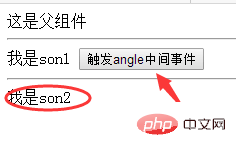
点击后:
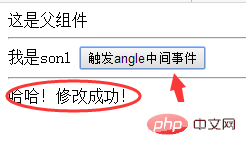
五、EventBus传参
1.在main.js种挂载全局EventBus
Vue.prototype.$EventBus = new Vue()
2.A组件
<template>
<div class="wrap">
<div>我是组件A</div>
<button @click="sendMsg">发送</button>
</div>
</template>
<script>
export default {
name: "A",
methods:{
sendMsg(){
this.$EventBus.$emit('sendMsg',"这是组件A发送的消息!")
}
}
}
</script>3.B组件
<template>
<div>
<div>我是组件B</div>
</div>
</template>
<script>
export default {
name: "B",
mounted(){
this.$EventBus.$on('sendMsg',(msg)=>{
console.log(msg);//这是组件A发送的消息!
})
},
}
</script>通过挂载全局Vue对象传递参数。
相关推荐:《vue.js教程》
以上是vue组件传值有哪五种方法的详细内容。更多信息请关注PHP中文网其他相关文章!
声明:
本文内容由网友自发贡献,版权归原作者所有,本站不承担相应法律责任。如您发现有涉嫌抄袭侵权的内容,请联系admin@php.cn
上一篇:vuejs怎么删除eslint下一篇:vue怎么导入echarts地图

